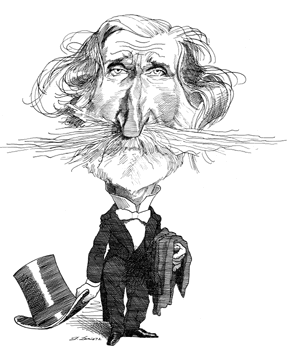A few years before his death Verdi wrote: “Never, never shall I write my memoirs! It’s good enough that the musical world has put up with my notes for so long a time. I shall never condemn it to read my prose.” I don’t think, however, that he would have any objection to our reading this selection of his letters, admirably translated and edited by Charles Osborne. It contains no embarrassing “human” documents, no love letters, for instance. Whether this is because Verdi never wrote any or because Mr. Osborne has had the good taste to omit them, I don’t know. Anyway, I am very glad. There is only one letter that could possibly be called “private and confidential,” Verdi’s reply to his old benefactor, Antonio Barezzi, who had taken him to task for not regularizing his relationship with Giuseppina Strepponi by marrying her.
I have nothing to hide. In my house there lives a lady, free and independent, who, like myself, prefers a solitary life, and who has a fortune capable of satisfying all her needs. Neither I nor she is obliged to account to anyone for our actions. But who knows what our relations are? What affairs? What ties? What rights I have over her or she over me?… I will say this to you, however: in my house she is entitled to as much respect as myself, more even.
As we know, they did finally get married in 1859. All that is puzzling, in view of how obviously well suited to each other they were, is why they did not do so earlier. My guess would be that it was she rather than Verdi who kept putting it off. There is one other piece of information in the letters that leaves me curious. In 1844-45 Verdi came near to a nervous breakdown, suffering severely from psychosomatic headaches and stomach cramps. What can the psychological trouble have been?
As we all recognize, the nineteenth century was the Golden Age of Opera, but I doubt if any of us, whether composers or opera-goers, would have liked to live in it. So far as composers were concerned, they were terribly overworked. It was a common clause in a contract that the finished score of a full-length opera was to be delivered within four months after the composer received the libretto. (Of all the great opera composers of the age, the only one who was not prolific was Bellini, and I have always wondered how this was financially possible for him.)
Then there were problems of copyright. In 1855 the House of Lords decreed that no foreign opera in England would have copyright unless the composer conducted the first performance himself. Then there was censorship. The setting of Ballo in Maschera had to be transferred from Sweden to Boston, and changes had to be made in the text of Rigoletto. Prima donnas were even more difficult to handle than they are now. (Today, the real pests are the stage directors.) When Sophie Loewe was to sing in Ernani, she objected to the opera ending in a trio. She wanted a brilliant cabaletta for herself alone and made the librettist, Piave, write one for her. Luckily, Verdi was adamant. The singer who was to sing Banquo in Macbetto objected to also taking the role of Banquo’s ghost.
Opera-goers, too, had much to put up with. There were boxes on the stage so that the curtain could not be brought up to the footlights, and there does not seem to have been an orchestral pit as we know it. (I was interested to learn that Verdi, like Wagner, wanted an invisible orchestra.) Then, as now, standards varied, of course, from opera house to opera house. After the premiere of Giovanna d’Arco at La Scala, Milan, Verdi was so disgusted that he refused to let them have another for forty-three years, when he gave them the first performance of Otello. The worst of all, he thought, was the Paris Opéra.
Everyone wants to pass judgment according to his own ideas, his own taste, and, which is worst of all, according to a system, without taking into account the character and individuality of the composer,…if a composer lives for too long in this atmosphere of doubt, he cannot escape having his convictions shaken a little, and begins to correct and adjust, or, to put it better, to look askance at his own work. Thus, in the end, you will have not a work in one piece, but a mosaic…. No one, surely, will deny the genius of Rossini. All right, but, despite all his genius, his Guillaume Tell has about it this fatal atmosphere of the Opéra; and sometimes, though more rarely than in the work of other composers, you feel there’s too much here, not enough there, and that it doesn’t move with the honesty and security of Il barbiere.
In one respect the musical scene has greatly improved since Verdi’s time. There are still many lovers of Wagner but no “Wagnerites.” We listen to Wagner one evening and to Verdi the next with equal pleasure and admiration. When one remembers the contempt in which the Wagnerites held Verdi as a composer, one is astounded by Verdi’s good temper and common sense. He believed that each country should be loyal to its own musical traditions. Thus, for Germans, whose musical founder was Bach, the Wagnerian development was right, but not for Italians, whose music stemmed from Palestrina. Though Verdi wrote a string quartet, a charming if not very important work, he did not approve of Italian string quartet societies: they were right for the Germans, but the Italians should found vocal quartet societies. The chief danger for contemporary composers, he thought, was a lack of simplicity.
Advertisement
Art which lacks naturalness is simply not art. Inspiration is necessarily born of simplicity…. We create big works rather than great works. And from the big are born the small and the baroque.
By simplicity, though, he did not mean verismo.
To copy truth may be a good thing, but to invent truth is better, much better.
His ideas about musical education are most interesting.
Practise the fugue constantly, tenaciously, to satiety, until your hands are strong enough to bend the notes to your will. Thus you will learn to compose with confidence, will dispose the parts well, and will modulate without affectation. Study Palestrina, and a few of his contemporaries. Then skip until you come to Marcello, and direct your attention especially to his recitatives….don’t let yourself be fascinated by beauties of harmony and instrumentation, or the chord of the diminished seventh, that rock and refuge of all of us who don’t know how to compose four bars without a half-dozen of these sevenths.
…No study of the moderns! That will seem strange to many. But when I hear and see so many works today, constructed the way bad tailors make clothes based on a model, I cannot change my opinion…. When a young man has undergone strict training, when he has found his own style and has confidence in his own powers, he can then, if he thinks it useful, study these works somewhat, and there will be no danger of his turning into an imitator.
It is clear from his own productions that he practiced what he preached. As a young man he did study very hard until he could make the notes go where he wanted and felt secure enough to obtain the effects he had in mind. But, on his own admission, he was one of the least erudite of musicians. He tells us, for instance, that he could not “get” a piece of music by reading the score, and he complained that many people went into ecstasies over much “classical” music when, if they had been honest, they would have admitted they found it boring. Nor did he ever try to ingratiate himself either with critics or the public. He was willing, he said, to accept their hisses on condition that he didn’t have to beg for their applause.
Though, unlike Wagner, he did not write his own librettos, he always knew exactly what he wanted and, if he was dissatisfied, could tell his librettist in detail why. Thus he writes to Piave, who was revising La Forza del destino:
You talk to me about 100 syllables!! And it’s obvious that 100 syllables aren’t enough when you take 25 to say the sun is setting!!! The line ‘Duopo e sia L’opra truce compita’ is too hard, and even worse is ‘Un Requiem, un Pater…e tutto ha fin’. First of all, this ‘tutto ha fin’ rhymes with ‘Eh via prendila Morolin’. It neither sounds well nor makes sense….
Then, the seven-syllabled lines!!! For the love of God, don’t end lines with ‘che’, ‘piu’ and ‘ancor’.
And here are his instructions to Ghizlanzoni about the finale of Aida.
Duet
O life farewell, earthly love
Farewell, sorrows and joys….
In infinity already I see the dawn,
We shall be united for ever in
heaven.(Four beautiful twelve-syllabled lines. But to make them suitable for singing, the accent must be on the fourth and eighth syllables.)
And he was equally clear in his mind about details of stage direction. He gave Morelli, who was to direct Otello, a precise description of what he wanted Iago to look like, and when he himself directed Macbetto, he had Banquo’s ghost emerge from a trap door immediately in front of Macbeth’s chair, whereas in most other productions he had merely entered from the wings.
Advertisement
Though there was one great tragedy in Verdi’s life when, in his middle twenties, he lost both his children and his first wife, one must say that, on the whole, his life was singularly fortunate. The son of an illiterate innkeeper’s family, he would never have gotten anywhere had not Barezzi made it financially possible for him to study in Milan. His life with Giuseppina Strepponi was obviously very happy. By the age of forty he was famous, and he might well have never written two of his most beautiful operas had he not, when old, found in Boito the ideal librettist for what he had in mind. (Incidentally, I am astounded to learn from an editorial note by Mr. Osborne that, as late as 1863, Boito, in praising Faccio, a composer of whom I have never heard, likened Verdi’s music to a “stained brothel wall.”) One feels that both as a composer and as a human being Verdi richly deserved his good fortune. In the case of most great men, I am content to enjoy their works. There are very few who make me also wish that I could have known them personally. Verdi is one of them.
This Issue
March 9, 1972




